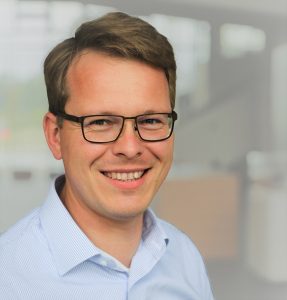That's right, Infineon is also on the AI learning path. Here, artificial intelligence is seen as a decisive enabler for digital transformation. Having grown out of a hype, AI is already field-tested in many areas and helps to master urgent challenges of our time. AI has long since become a competitive factor for companies.

What does this mean for Infineon in concrete terms?
To understand these words and fill them with life, we spoke with Nico Kelling. As head of the AI Center of Excellence, he takes care of AI in all its facets across the group at Infineon: finding use cases, defining innovation processes, implementation, and cultural change with employees. "My team serves as a compass and a supporter. We lead a workforce that is definitely already very tech-savvy with regards to the next level of AI maturity." In other words, his team coordinates activities across the company . This also comprises co-innovation activities to a large extent
Where can AI make work easier and deliver better results?
By co-innovation approach, Kelling means shared learning across departmental boundaries. His team promotes exchange, moderates and ensures a value-oriented approach. To do this, he first needs his own ecosystem as well as innovation approaches that are universally valid and understandable. Collaboration with external entities such as research institutions or startups is part of this, as is exchange with other companies.
"If we succeed in weaving the technology broadly into European fields of expertise such as mobility, industrial and plant control, or product development, the foundation will be laid for prosperity and competitiveness for decades to come."
Kelling is an optimist and believes that the environment also will benefit from AI: "Ultimately, we can generate more from less with AI. Take chip design, for example: we're already analyzing how to get the same chip performance with fewer basic materials." How so? "Chip design is a multi-layered optimization question. We're responding to that with AI, too."
Educated Decision - will humans become superfluous?
No, AI will always play the role of a smart assistant in these processes. Humans are not being replaced; they can use AI to make data-based and faster decisions. And here it becomes obvious why Kelling says AI is a learning journey for the company as a whole. "Nothing is set in stone, it is trial and error. Where AI can end up being used efficiently is shown by each use case. In chip design, predictive maintenance in production or smart supply chain control, it has already proven its enormous potential."
And when does the learning journey end? "When a standardized procedure for others can be derived from a successful use case. Collaboration and best practice sharing are key to our success in the AI age."
Cultural change - traceability, data sharing
Well Infineon is a technology company. You'd think there wouldn't need to be a culture change to successfully leverage AI for Infineon's benefit. But here, too, Kelling surprises us. Sure, the conditions at Infineon are ideal, he says.
"Nonetheless, we need to rethink our approach to data sharing. And that requires a change. If we understand data as a source of value, we need to share and provide data better. That changes a lot of roles and decision-making structures in the company."
But his team has one more goal. Namely, to expand AI expertise at all levels, and turn AI from a blackbox to a whitebox: "If we want robust, transparent and explainable results, we need to be able to accurately assess the possibilities and limitations of algorithms."
Transparency is more important than ever, especially because Infineon keeps breaking new ground in human-machine interaction with its products. Here, AI must not overwhelm; it must remain comprehensible. "My conclusion is therefore: we must bring the possibilities of technology in line with our values. A human-centric AI will ultimately find acceptance among employees and customers."
You can hear a more in-depth conversation about the transformation in our podcast with Nico Kelling in an upcoming KI Kompakt podcast episode.
